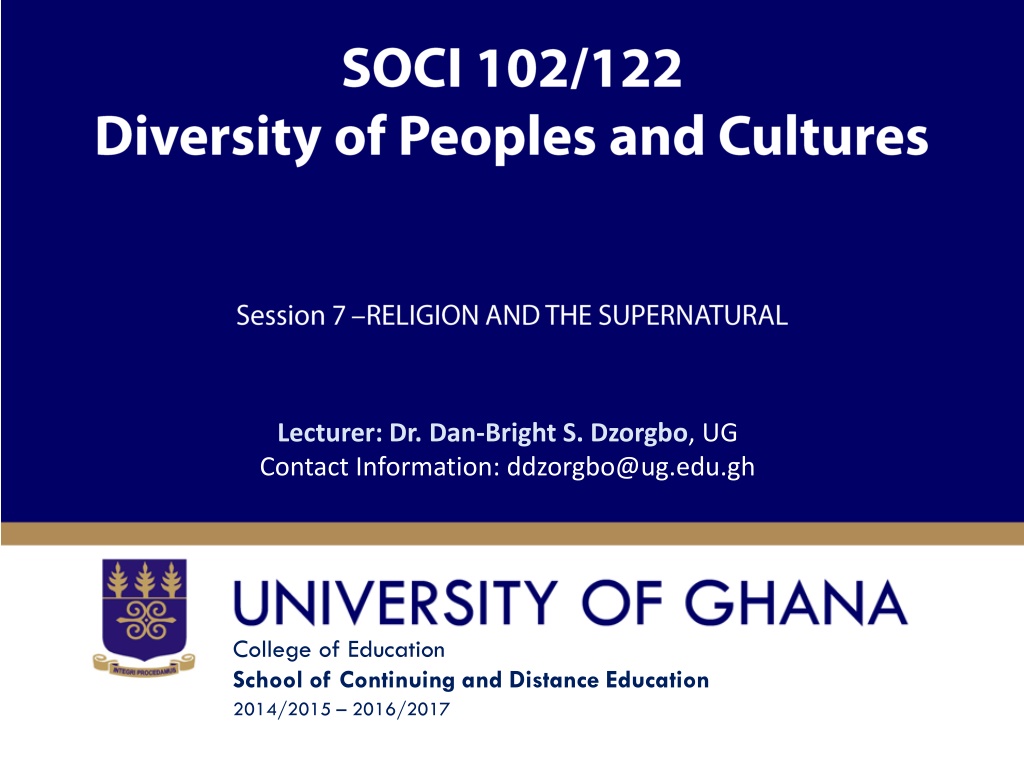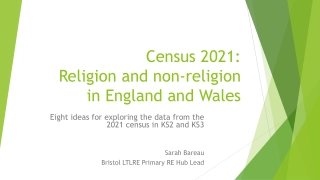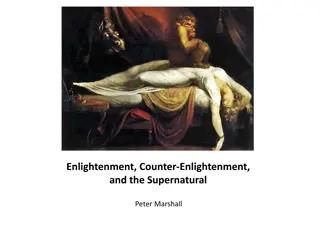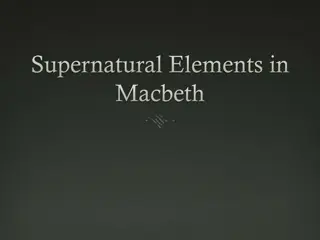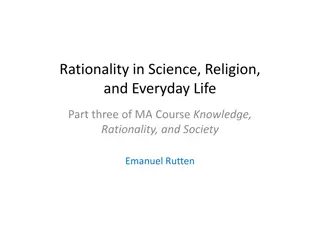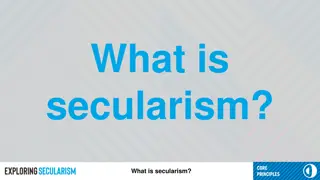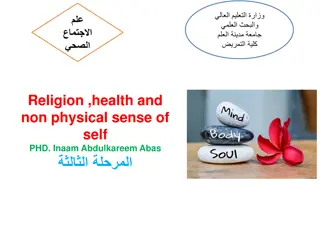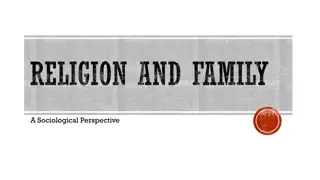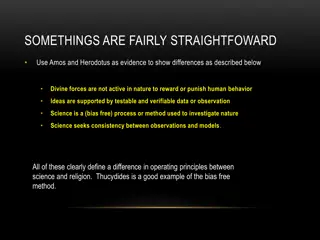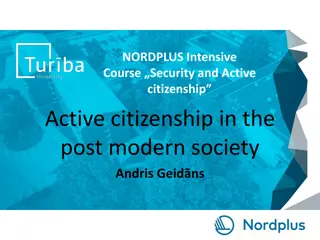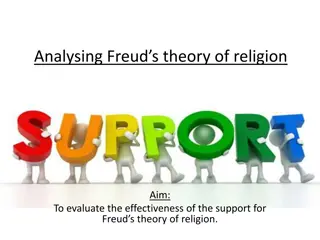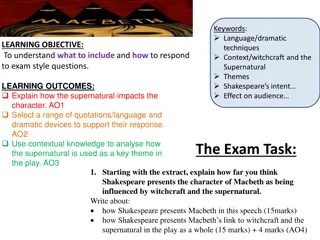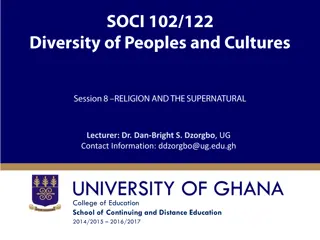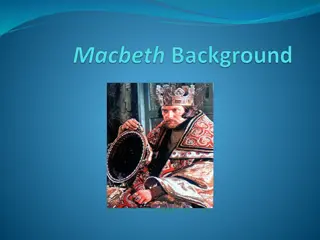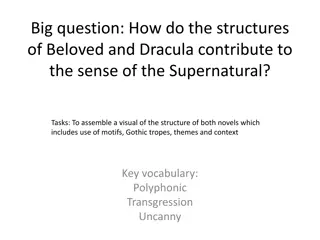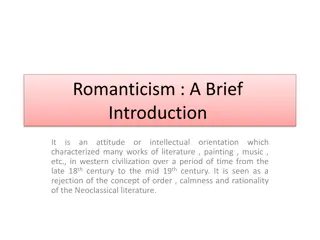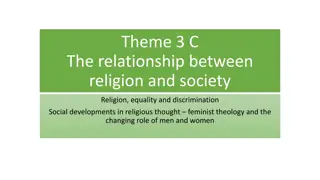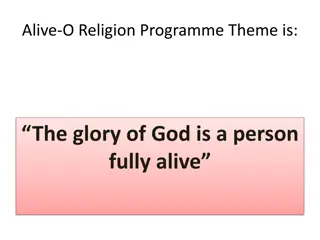Religion and the Supernatural in Society
This session introduces the concept of religion and its connection to the supernatural, exploring various definitions, sociological and anthropological perspectives, theories, and functions of religion. The session aims to enhance understanding of religious diversity and the significance of supernatural beliefs in different societies.
Download Presentation

Please find below an Image/Link to download the presentation.
The content on the website is provided AS IS for your information and personal use only. It may not be sold, licensed, or shared on other websites without obtaining consent from the author.If you encounter any issues during the download, it is possible that the publisher has removed the file from their server.
You are allowed to download the files provided on this website for personal or commercial use, subject to the condition that they are used lawfully. All files are the property of their respective owners.
The content on the website is provided AS IS for your information and personal use only. It may not be sold, licensed, or shared on other websites without obtaining consent from the author.
E N D
Presentation Transcript
Lecturer: Dr. Dan-Bright S. Dzorgbo, UG Contact Information: ddzorgbo@ug.edu.gh College of Education School of Continuing and Distance Education 2014/2015 2016/2017
Session Overview Introduction This session deals with religion and the supernatural. Religion exists in one form or the other in all societies. There is therefore religious diversity in the world. There are also beliefs in the supernatural beings. Apart from the ultimate God that forms the basis of some major religions, there are also beliefs in the supernatural entities which are considered as religious. Other supernatural beliefs include the belief in the lesser gods, the Ancestors, Angels, Demons, Devils, Ghosts, Shaman, witches, etc. All these are seen by many people as having supernatural powers. The supernatural is the realm that is beyond our ken or our understanding. Religious beliefs normally portray the world supernaturally rather than scientifically. In this Unit, we shall learn about some of the forms this universal social institution takes and the meanings they have for those who adhere to them. However, the emphasis would be traditional religion and religious belief systems. These issues will be pursued in this session and the next. Objectives Define religion Explain why sociologists and anthropologists are interested in religion Explain the various theories of religion Functions of Religion Slide 2 Dr. Dan-Bright S. Dzorgbo, Sociology Dept. UG
Session Outline The key topics to be covered in the session are as follows: Topic One: Definitions of Religion Topic Two: Why sociologists and anthropologists are interested in religion Topic Three: Theories of Religion Topic Four: Functions of Religion Slide 3 Dr. Dan-Bright S. Dzorgbo, Sociology Dept. UG
Reading List Assimeng, M. (1999), Social Structure of Ghana, Tema, Ghana Publishing Corporation. Kottak, C. P. (2004), Cultural Anthropology, Boston, McGraw Hill Corporation. Kottak, C. P. (2004), Anthropology: The Exploration of Human Diversity, Boston, McGraw Hill Corporation. Nolan, P. & G. Lenski, (2004 or any of the newer editions), Human Societies: An introduction to macrosociology, Boulder Paradigm Publishers. Nukunya, G. K. (2006), Tradition and change in Ghana: An introduction to sociology, Accra, Ghana University Press. Sanderson, S. K. & A. S. Alderson (2005 or its newer editions), World societies: the evolution of human life, Boston, Pearson Education Inc. Crapo R. H. (2002 or newer editions) Cultural Anthropology: Understanding Ourselves & Other, Boston, McGraw Hill. Slid Dr. Dan-Bright S. Dzorgbo, Sociology Dept. UG
Topic One: Definition of Religion The anthropologist Anthony F. C. Wallace defines religion as belief and ritual concerned with supernatural beings, powers, and forces (1966:5). Crapo (2002: 198) sees religion as belief in supernatural beings and supernatural power, symbolic expressions of feelings and rituals performed both individually and in groups for the purpose of influencing supernatural beings and powers . Emile Durkheim defines religion as, a unified system of beliefs and practices related to sacred things, that is to say things that are set apart and forbidden beliefs and practices which unite one single moral community called a church all those who adhere to them (Durkheim, 1915). Frazer (1890) defines religion as, the propitiation or conciliation of powers superior to man which are believed to direct and control the course of nature and of human life. What is clear from all these definitions is the stress on beliefs and practices that have to do with the supernatural. The various definitions available indicate that religion is a set of ideas, beliefs, practices or rituals possessed by a group of people and directed towards supernatural forces in order to influence or to benefit human existence. These supernatural forces can believed to found in the Almighty God, ancestors, gods, witchcraft, spirits, evil forces believed to be found in people, rivers, seas, forests, etc. that people believe have supernatural powers to influence human action Slide 5 Dr. Dan-Bright S. Dzorgbo, Sociology Dept. UG
Topic Two: Sociological and Anthropological Interest in Religion Anthropologists and sociologists are interested in religion because: Religion is one of the social institutions of society just like the family, politics and what have you, Anthropologists and sociologists are interested in the social significance of religion, that is, what religion does for society and its members. They are not so much interested in the claims of religion about the life after death. Because as scientists they cannot prove that Rather they want to ask what functions (manifest and latent) religion performs for society, just as they would ask what functions do the family and politics perform for society. Sociologists and anthropologists are interested in explaining human behaviour in different times and societies, in what makes for conformity and deviance, social order and change and the overall functioning of human societies. In all these matters religion plays a crucial role as indicated by functions of religion below. Slide 6 Dr. Dan-Bright S. Dzorgbo, Sociology Dept. UG
Topic Three: Theories of Religion There are many theories to explain the existence of religion. Some are: Animism developed by Edward Burnett Tylor (1871/1957). According to Tylor, this is the earliest religion that our ancestors developed as a result of their inability to explain dreams, trances and death so they concluded that humans have two entities: the body and soul. During dreams the soul gets the chance to express itself and during death, the should permanently leaves the body. Religion according to Tylor developed from Polytheisim (the belief in multiple gods) to monotheism (belief in one most powerful deity). According to Tylor religion is often used to explain things that people don t understand so once science offers more and better understanding for things, religion would decline demystification and secularization of the world Slide 7 Dr. Dan-Bright S. Dzorgbo, Sociology Dept. UG
Topic Three: Theories of Religion (cont d) One other theories are: Muller: Close Tylor sargument is Muller s view that the mysterious and baffling nature of life made humans to acknowledge that there must be some forces or powers that are greater than their ability. Durkheim: The Sacred and the Profane, Totemism as the simplest form of religious Durkheim: Social Function of Religion: Social solidarity Slide 8 Dr. Dan-Bright S. Dzorgbo, Sociology Dept. UG
Topic Four: Functions of Religion There are many functions of religion. The major ones are: Religion maintains social order Religion reduces of anxiety Religion provide cognitive balance, resolves ambiguities and provides explanations for things we cannot understand Slide 9 Dr. Dan-Bright S. Dzorgbo, Sociology Dept. UG
Conclusion In this session: we have provided a definition of religion. we noted that religion is found in all societies but in different forms hence we have religious diversity in the world we have explained that sociologists and anthropologists are interested in studying religion not because of its truthfulness or otherwise but because of its social significance we have learnt two theories of religion: theory of animism and theory of the sacred and profane we noted three major functions of Religion: social order maintenance, anxiety control and cognitive balance Slide 10 Dr. Dan-Bright S. Dzorgbo, Sociology Dept. UG
